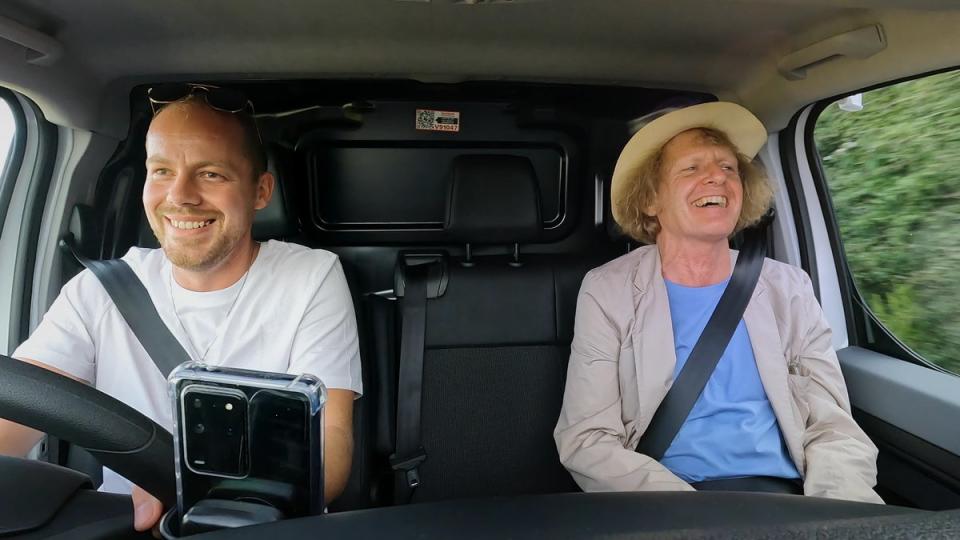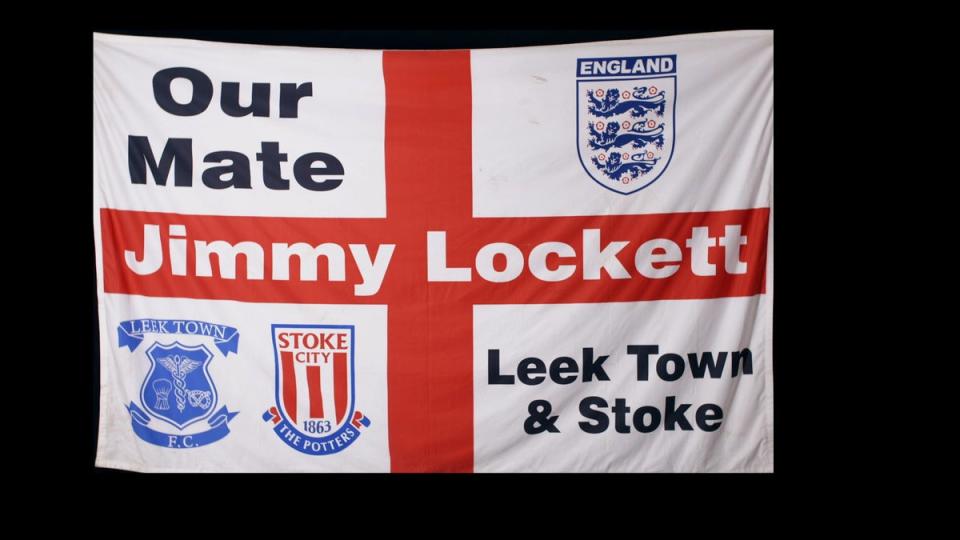Grayson Perry’s Full English on Channel 4 review: a typically incisive look at what it means to be English

It’s no use saying “Don’t mention the War!” We’re less than five minutes into the first episode of Grayson Perry’s new Channel 4 series when the Second World War rears its tiresome head in a conversation with Dover’s leading self-appointed migrant-spotter, Jeremy Davis, because of course he’s called Jeremy, and of course he’s obsessed with the war.
If you were expecting cosiness from Grayson Perry’s Full English, a road trip through England with a white van man (his name is Kirk, he’s from Yorkshire) on a foray into what it means to be English, then look away now. This first episode, set around the South East, kicks us off right in the thick of the country’s thorniest debate. Perry opens the series in Dover, where nearly 50,000 people a year are landing after undertaking the treacherous, terrifying trip across the Channel.
Jeremy, who is a wedding DJ with a whispy white mane and a beady necklace, and who you couldn’t invent if you tried, is deeply concerned by all this. He has set up a Twitter feed, and makes propaganda videos to alert people to the arrivals, whom he calls “illegals without IDs”.
“We don’t know who these people are,” he frets. “Something terrible is going to happen.”
They’re looking for a home, Perry says, mildly (though do I detect a hint of frustration?). “They’ve got a home, they’re looking for a better home,” is Jeremy’s quick retort, which I suppose is technically true but doesn’t really tell the full story, particularly if they come from, I dunno, Syria, or Afghanistan.

What exactly is he defending? “It’s history,” comes the wiffly response; “My family – they’re all military – they all fought for this country, they all love this country; it’s that, I suppose,” which is startlingly vague considering how dedicated Jeremy is to his unformed cause. As Perry says, Jeremy’s notion of this country is one of “a bygone England, one that bears little resemblance to the multicultural country we live in today”.
Perry, whose previous TV series have looked at class through the prism of taste; ideas of masculinity; and rites of passage across cultures, always has an art angle on his investigations. This time, he is collecting items from the people he encounters which, for them, exemplify what it means to be English. Jeremy’s is not a surprise – a silver salver that belonged to an ancestor who defended the port of Lisbon during, you guessed it, the Second World War. He thinks the notional similarity between what they do is “poetic”, though I’d use another p word.
Anyway, it’s a great start to a show that comes at the concept of who we are from unexpected angles. Perry’s second interviewee, Jay, is a data analyst and football fan from Lambeth, one of London’s most culturally diverse boroughs; a black man who is a veteran of more than 100 England matches, and whose crystalline, articulate discussion of Englishness is so far from Jeremy’s flabby waffle as to make you want to weep with national pride.
His England is that of the now. “It’s important to me that my version of England is seen as being English,” he tells Perry over a pint in Munich, where England are playing, surrounded by genially pissed up footie fans. These include two of his white mates who look as though this is literally the first time they’ve ever thought about this, which might well be the case. His chosen object is an England flag, dedicated to his late pal Jimmy, a man from a different background and different generation, who became his best mate through their shared passion for football.
And I haven’t even told you about the British Druid Order, whose gentle but steely dedication to their softcore paganism (up in popularity by 25 per cent in recent years, though still, it appears, a majority middle-aged religion) is a delight to behold as they take Perry, dressed up as a deer (and this is very much his bag, you feel), along on one of their rituals to honour the spirits of nature.

They’re a practical, make-do sort of bunch – the guy dressed as a corvid retains his blazer, which sort of feels in keeping with the role in a Neil Gaiman-ish sort of way, and I particularly loved the willow lady, whose green floaty dress almost certainly had a previous life at a summer wedding.
They too have thought hard about what it means to be part of this England, with its deep, gnarly folklore and dark magic. The order’s founder, Greywolf (otherwise know as Philip) can trace his ancestry to 20 years after the Domesday Book – and he doesn’t give a monkey’s. He doesn’t really believe in national borders, and calls nationalism “an abomination”.
“After the last Ice Age, there were no people here,” he points out. “People have been arriving ever since, and they’re still arriving. As far as I’m concerned, if you arrived here yesterday on a small boat across the Channel, you’re every bit as English as I am.” Jeremy would have a fit. The contrast between these two weirdy, unbeardy, long-haired old men couldn’t be more stark.
Perry is an old hand at this now, and it shows – perhaps the reason for bringing Kirk along as his sidekick. It’s a slightly odd pairing, and isn’t quite working one episode in – the moments where Perry tells Kirk his impressions of what he’s seen, which he might have addressed straight to the camera before, feel a tad contrived and ever so slightly condescending.
I hope Kirk, who seems slightly bemused by the whole thing, will come into his own as the series progresses, perhaps in episode three, when the pair get onto his home turf of the North. This feels bittier than previous series, but perhaps that’s because we’re now so used to Perry’s genially incisive modus operandi.

This is a promising start though. Perry ends by joining a friendly group in the world’s most polite protest (they have a procession, climb over a fence, and sit under an oak they’re not meant to sit under, listening to folk songs) against the limiting of access for the public to vast swathes of England. They highlight the dichotomy of the English obsession with hierarchy – which allows the private ownership of insanely large amounts of hill and dale – sitting uncomfortably alongside our deep conviction that our nationhood is tied up with the land.
Their last protest, they tell Perry, was on the land of the Duke of Bedford, who owns an estate of roughly 52,000 acres (more than twice the size of the Caribbean island of Montserrat, the World Land Trust tells me). “What can he be doing that he can possibly require that much privacy?” one asks, which seems like a reasonable question when you put it like that.
The next episode, trailed at the end of the first, will take Perry and Kirk to the Midlands, to a non-white England that will, I hope, open up ideas of what this country is beyond nostalgia for half-remembered, half-understood pasts. “When do you feel English?” he asks a South Asian family over dinner. “When I go to India!” comes the reply, and they all hoot with laughter.
Grayson Perry’s Full English starts on Channel 4 on Thursday January 26 at 9pm

 Yahoo Sport
Yahoo Sport 





































